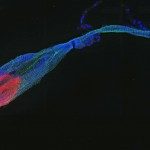Lien vers Pubmed [PMID] – 12139429
Int. J. Med. Microbiol. 2002 Jun;292(1):51-7
Among rapidly-growing opportunistic mycobacteria, organisms of the Mycobacterium fortuitum-Mycobacterium chelonae complex (M. fortuitum, M. chelonae, M. abscessus and M. peregrinum) were isolated in significantly higher numbers during the period 1993-99 from clinical samples in Guadeloupe, Martinique and French Guiana. Based on biochemical and cultural tests and PCR-restriction fragment length polymorphism (RFLP) of the hsp65 gene, 51 isolates from 47 patients were unambiguously identified as M. fortuitum. A molecular epidemiological study by pulsed-field gel electrophoresis (PFGE) using DraI and Xbal digestions of bacterial DNA revealed two clusters designated A and B; cluster A was composed of strains showing 10 bands that were isolated from 3 patients in Martinique within a 2-months period in 1999, and the cluster B was composed of 2 strains showing 9 bands from 2 patients in Martinique, also isolated within a 2-months period in 1999. The available epidemiological and clinical information neither incriminated M. fortuitum as a cause of disease in these patients, nor showed any potential epidemiolgical links between them, except for the fact that the samples were processed in the same microbiology laboratory within a short span of time. In conclusion, isolation of M. fortuitum from non-sterile sites in patients without predisposing conditions, and in absence of repeated isolation, may be caused by contaminants or colonizers that are picked up more easily due to improvement of techniques used for mycobacterial isolation and identification.
